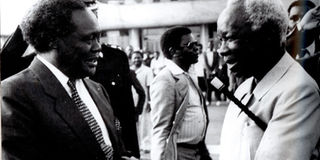Nyerere urges DP’s Ssemogerere to accept poll results, join Parliament

Dr Milton Obote greets his mentor, Tanzanian President Julius Nyerere, during the latter’s visit to Uganda in the early 1980s. COURTESY PHOTO
What you need to know:
Ssemogerere, scared that the country might plunge into untold bloodshed as warned by powers that matter – Tanzania , advises his party members not to boycott Parliament as had been suggested by other elements.
Kampala
Tanzanian President Julius Nyerere, following the return of Obote to power, spent more time on phone ‘monitoring’ the political tide in Kampala.
In the previous article, we noted that on December 13, DP supporters had planned to pour onto the streets in protest of the stolen election.
The UPC allies, panicking that their intention to bring democracy in Uganda would nosedive, accorded the ongoing situation undivided attention. It is said Brigadier David Oyite-Ojok went to Semogerere’s home in Rubaga to appeal to him to tell his supporters not to demonstrate.
Francis Bwengye in his book, The Agony of Uganda: From Amin to Obote, expresses the tension that was building at the moment. “Oyite Ojok warned that if such demonstrations erupted, soldiers would confront them with “maximum force”. He revealed that the UNLA had ‘for security reasons’ banned UPC celebrations and parades in the capital. He also appealed to the DP leadership to accept the results as they were,” he says.
Nyerere, meanwhile, called Ssemogerere, urging him to accept the results and Bwengye says he heard the DP leader telling the Tanzanian president that they were considering rejecting the results, and at far, the whole exercise.
Nyerere’s warning
In return, Nyerere warned the opposition that if they boycotted Parliament, “the country would be plunged into untold catastrophe and bloodshed.” He reportedly advised the opposition to go to courts of law where their electoral grievances would be settled. The DP itself, following Nyerere’s ‘words of wisdom’, began to pull strings on whether to accept or reject the results.
Ssemogerere, forinstance, “started lamenting that he was not prepared to go into exile again”. The DP man is said to have tabled his fears that if the civil unrest ensued, the blame would be heaped on their shoulders, a task he was not ready to carry.
Evaristo Nyanzi and Zachary Olumu supported Ssemogerere but Boniface Byanyima and Tiberio Okenyi Atwoma read from a different script. By the day Obote and his Cabinet were being sworn-in, the DP’s camp was deeply being eaten up by disparity. Byanyima and other officials boycotted a meeting held by the party’s National Council, reportedly protesting the move by the party’s leadership not to reject the results.
Ssemogerere, who had been summoned by Paulo Muwanga, who would later become vice-president, told the party officials not to let down those who sent them to Parliament.
It is said he cautioned members not to take the advice of the ‘militant leaders’ who were not ready to accept the results. Dissent from within was exposing DP’s wavering willingness to fight as a body.
The UPC at this time seemed to have got a lease of life. With its opposition divided, it was apparent that Nyerere’s shadow was being cast broadly even into DP’s chambers. Ssemogerere had developed cold feet over opposing the new Kampala regime albeit he and his party members had pointed to a stolen vote to have brought back Obote.
After a heated debate, it is said members, who had argued that joining Parliament was like acknowledging the legitimacy of the UPC government, left the matter on whether to join the House or not to elected members. But Ssemogerere had warned that those who had issues with elections in their counties would go to court and that he would let those who had boycotted Parliament decide within their own constituencies.
A new page had been opened in DP’s list of frustrations. Divided opinion too, gave Obote more leverage. Seeing that dialogue, even within their own party, had failed the DP members opted to take up arms.
The disgruntled take up arms
“Many of us opted for armed resistance. In an about-turn from the decision in the NC, we expressed our indignation to those members who had decided to give Obote a boost by rubbing shoulders with him in Parliament when he was there illegally. It was thus decided that each one of us starts to mobilise the masses to give unequivocal support to the armed struggle and the people’s war,” Bwengye notes.
To this, we can authoritatively state that human error had again changed the course of the country’s political history. The leadership decided to take their seats in Parliament much to the disappointment of their supporters.
However, one of Democratic Party’s younger leaders Andrew Kayiira did take up arms to fight the new government, joining an organisation called Uganda Freedom Movement.
At Parliament, Obote, whom opposition members and the masses said was in the House ‘illegally’, enjoyed numerical strength.
But it should be noted that Muwanga and Obote, even before the election, had seen through the mist. In a maneuver to strengthen UPC in Parliament, Muwanga made moves that would see the president name more members to Parliament.
On the election eve, Muwanaga issued a proclamation which was meant to legalise the UPC’s move to expand Parliament and increase numbers in case they succeeded. Thus, Article 40 of the 1967 Constitution, had been amended although it is not clear whether it was legal for such a document to be changed overnight. Obote and his party would now rule the government, but the civil unrest outside Parliament was another hard nut to crack.




